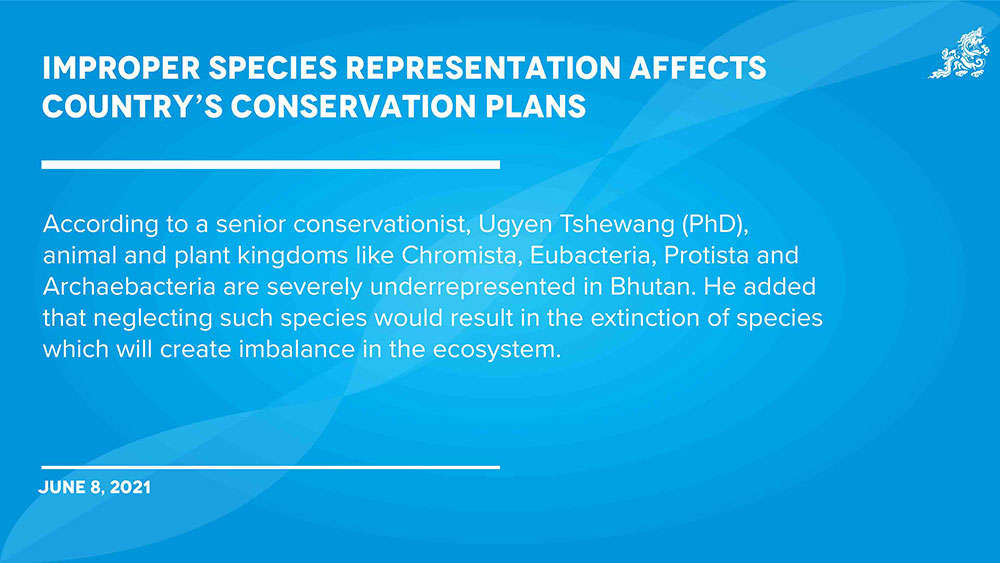The animal and plant kingdom comprised of 93 percent of all species in Bhutan, but other kingdoms like Chromista, Eubacteria, Protista and Archaebacteria are severely underrepresented, according to a senior conservationist, Ugyen Tshewang (PhD).
Currently not a single species is recorded under the kingdom Archaebacteria. Representation of Kingdom Chromista, Eubacteria, Protista, and Archaebacteria is less than one percent in the records.
He said that societal preference, funding agencies, researchers, and geopolitical and economic conditions could be the reason for the gaps and taxonomic chauvinism. “That needs to be rectified to ensure adequate knowledge of all ecosystems.”
Ugyen Tshewang said that as a least developed country, Bhutan’s conservation programmes have been largely donor-driven mostly for charismatic and keystone species of animals.
“This has perpetrated a distinct bias in research which Bhutan shares with other donor-dependent nations.”
Although recognised as an ancient form of life with potential for applications in science and technology, food industries, and environment-friendly processes, he said that the kingdom Archaebacteria was totally neglected in research and studies. “Identification and inventory of species in the kingdom could be a useful tool for developing the conservation strategies to halt their disappearance in the face of climate change and environmental pollution.”
In his recently published book ‘Bhutan: Conservation and Environmental Protection in the Himalayas’, Ugyen Tshewang wrote that as the 10 protected areas represent the national conservation domains, there is complacency stemming from the perception of conservation success in Bhutan. “This has all, but co-opted research on the underrepresented species which do not feature in the conservation strategies and plans of the protected areas.”
An environmental researcher and a herpetologist, Jigme Tshelthrim Wangyal, said that species in the reptiles and amphibians family do not get enough conservation support in the country. “There are myths surrounding these species, which makes the field of study unattractive. Except for vipers, cobras, kraits, and coral snakes, people need to understand that all snakes are not venomous.”
However, he said that the country’s approach to conservation is holistic, which means that if forest is conserved other species occupying the forest are conserved too.
The country has more than 100 species of snakes. King and Spectacled Cobras and Python are listed as vulnerable under the IUCN list. “Rest of the species are either data deficient or in the least concern category.”
Deputy chief biodiversity officer with the National Biodiversity Centre, Choki Gyeltshen, said that although species research is improving annually, it is primarily focused on keystone species such as bigger mammals, plants and a few insect groups.
“To have inclusive research, the focus needs to be on the invertebrates such as snails, bees, wasps, and other lower plant groups like mosses and lichens. Without inclusive information for species management and decision making, there could be lapses in effective conservation,” he said.
He also said that neglecting such species would result in the extinction of species which will create imbalance in the ecosystem. “For example, ignoring research on bees will threaten food security, as they are the key pollinators of crops.”
As of 2019, Bhutan Biodiversity Portal’s taxonomic information shows that the country has recorded a total of 11,248 known species.
Of the 134 threatened species, the highest number of threatened species recorded were from the plant groups (48 species), birds (30 species), mammals (26 species), and amphibians and reptiles (18 species).
One of the orchid species has gone extinct, while the plant species Brugmansia suaveolens belonging to class Solanaceae has gone extinct in the wild.
Recommendations
Ugyen Tshewang recommended a thorough assessment of Bhutan’s biological diversity to enable conservation actions in the country since Bhutan is one of the 36 global terrestrial hotspots in biological diversity.
He said community participation among biodiversity stakeholders could address the gaps in developing holistic information systems and databases from across the country. “Bhutan Biodiversity Portal needs to promote all sections of the society.”
Students, researchers, policy makers, conservationists, amateur naturalists, and tourism operators, he said, could play an important role in the feedback system of providing information on species for the conservation of Bhutan’s biological wealth.
He said as a major policy intervention for the protection of critically endangered, endangered, and vulnerable species, the “Endangered Wildlife Act” of Bhutan could provide a strong legal protection under the current national legislations.
Choki Gyeltshen said that research needs should be strengthened species-specific.
Researchers, he said, should be provided with basic research facilities such as DNA sequencing equipment and laboratories through funding support.
By Choki Wangmo
Edited by Tashi Dema


